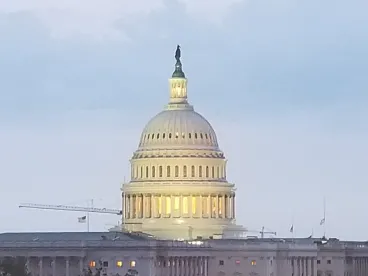On May 12, 2020, the U.S. House of Representatives introduced the Health and Economic Recovery Omnibus Emergency Solutions Act (“HEROES Act”), which, among other things, would significantly expand coverage and benefits available under the Families First Coronavirus Response Act (“FFCRA”). As we have discussed at length in numerous prior posts, the FFCRA provides for paid sick leave for certain coronavirus-related reasons, as well as leave under the Family and Medical Leave Act (“FMLA”) to care for a child whose school or care provider is closed or unavailable due to COVID-19 (“emergency FMLA” or “EFMLA”).
Under the current proposed bill, the HEROES Act would expand FFCRA coverage to employers of all sizes and across all industries without exemption. Presently, only employers with fewer than 500 employees are covered by the FFCRA paid leave requirements. The law also currently provides for exemptions for healthcare workers and first responders, as well as certain exceptions for employers with fewer than 50 employees.
The HEROES Act would also significantly expand the covered reasons for which employees may take paid leave under the FFCRA. Specifically, under the proposed bill, employees would be eligible to take up to 80 hours (or, for part-time employees, the equivalent of two weeks) of emergency paid sick leave and up to 12 weeks of emergency FMLA leave for any one or a combination of the following reasons:
- the need to self-isolate because the employee is diagnosed with COVID–19;
- to obtain a medical diagnosis or care if such employee is experiencing the symptoms of COVID–19;
- to comply with a recommendation or order by a public official or a health care provider to self-isolate on the basis that the physical presence of the employee on the job would jeopardize the employee’s health, the health of other employees, or the health of an individual in the household of the employee because of (i) the possible exposure of the employee to COVID–19, or (ii) the fact that the employee is exhibiting symptoms of COVID–19;
- to care for or assist a family member of the employee, without regard to whether another individual is available to provide such care, because the family member is (i) self-isolating because they have been diagnosed with COVID–19, or (ii) is experiencing symptoms of COVID–19 and needs to obtain medical diagnosis or care, or where a public official or a health care provider makes a recommendation or order with respect to such family member that the presence of the family member in the community would jeopardize the health of other individuals in the community because of the possible exposure of such family member to COVID–19 or the fact that the family member is exhibiting symptoms of COVID-19;
- to care for a son or daughter if the child’s school or place of care has been closed or child care provider is unavailable due to COVID–19; and/or
- to care for a family member who is incapable of self-care because of a mental or physical disability or who is a senior citizen, without regard to whether another individual is available to care for such family member, if the place of care for such family member is closed or the direct care provider is unavailable due to COVID–19.
Employers would still be able to utilize payroll tax credits to cover the cost of wages paid to employees under the emergency paid sick leave and emergency FMLA provisions up to the statutory maximum amounts (though, as noted below, the statutory caps for certain covered reasons for emergency paid sick leave, as well as for aggregate benefits under the EFMLA, would increase under the proposed bill).
Some other key highlights of the proposed HEROES Act as they relate to FFCRA include:
- Expanding FFCRA eligibility through December 31, 2021.
- Presently, FFCRA leave is only available through December 31, 2020.
- Requiring employers to allow employees to take both emergency paid sick leave and emergency FMLA intermittently or on a reduced schedule if requested.
- Presently, intermittent and reduced schedule leave is only available if the employer permits an employee to take leave intermittently.
- Providing that emergency paid sick time for any of the above covered reasons be subject to a maximum rate of $511/day and $5,110 in the aggregate.
- Presently, leave to care for an ill family member or a child whose school or place of care is closed is subject to a lower maximum rate of $200/day and $2,110 in the aggregate.
- Making the full allotment of emergency paid sick time available to employees once every 12 months.
- Presently, the 80 hours (or two weeks) of emergency paid sick leave is only available to a given employee as a one-time use benefit.
- Providing that an employer requiring certification for emergency paid sick leave may not request such documentation unless the employee takes more than three (3) consecutive days of leave, and the employee must be given up to seven (7) workdays after the employee returns from leave to provide the certification.
- Presently, there are no such time limitations on requesting or receiving documentation of leave.
- Requiring that EFMLA pay (which would be capped at $200/day for any covered reasons) be paid beginning on the first day of leave, and increasing the aggregate benefit maximum to $12,000.
- Presently, the first two weeks of EFMLA may be unpaid unless an employee elects to substitute available paid leave, and the aggregate maximum benefit is $10,000.
- Providing that EFMLA would not count toward the employee’s general 12 week allotment of non-emergency FMLA time.
- Presently, EFMLA leave counts toward an employee’s total bank of FMLA time.
- Prohibiting an employer from requiring an employee to substitute vacation, personal, or sick leave during EFMLA (though an employee may still elect to substitute such available paid time).
- Presently, an employer may require an employee to substitute available paid leave during EFMLA following the first 10 days of leave.
- Providing that any vacation, personal, or sick leave that an employee elects to use during EFMLA would not count toward the $200/day and $12,000 maximum limitation.
- Presently, no such limitations exist.
- Providing that an employee would have to five (5) weeks after the date on which the employee begins taking EFMLA to provide documentation for certification of the leave.
- Presently, employers are permitted to request documentation upon request for leave.
The HEROES Act would also make a temporary modification to the eligibility requirements for non-emergency FMLA leave (that is, FMLA leave taken for an employee’s own serious health condition, to care for a family member with a serious health condition, to care for a new child, or for certain military-related reasons). The proposed bill would temporarily (through December 31, 2022) suspend the minimum 1,250 work hour eligibility requirement, as well as reduce the 12 month service requirement to 90 days.
The proposed bill also includes certain provisions relating to employee safety. Notably, the bill would require OSHA to promptly issue an enforceable emergency temporary standard (“ETS”) relating to COVID-19 that would be applicable to all employers. The ETS would have to, among other things, require employers to develop and implement infection control plans. The bill would also requires OSHA to issue a permanent comprehensive infectious disease standard within two years.
* * *
It remains to be seen whether the HEROES Act and its above changes will see the light of day, as Congressional Republicans have expressed significant disapproval for the bill as a whole and its approximately $3 trillion dollar price tag. We will continue to closely monitor developments on this bill and provide updates as they become available.





 />i
/>i

